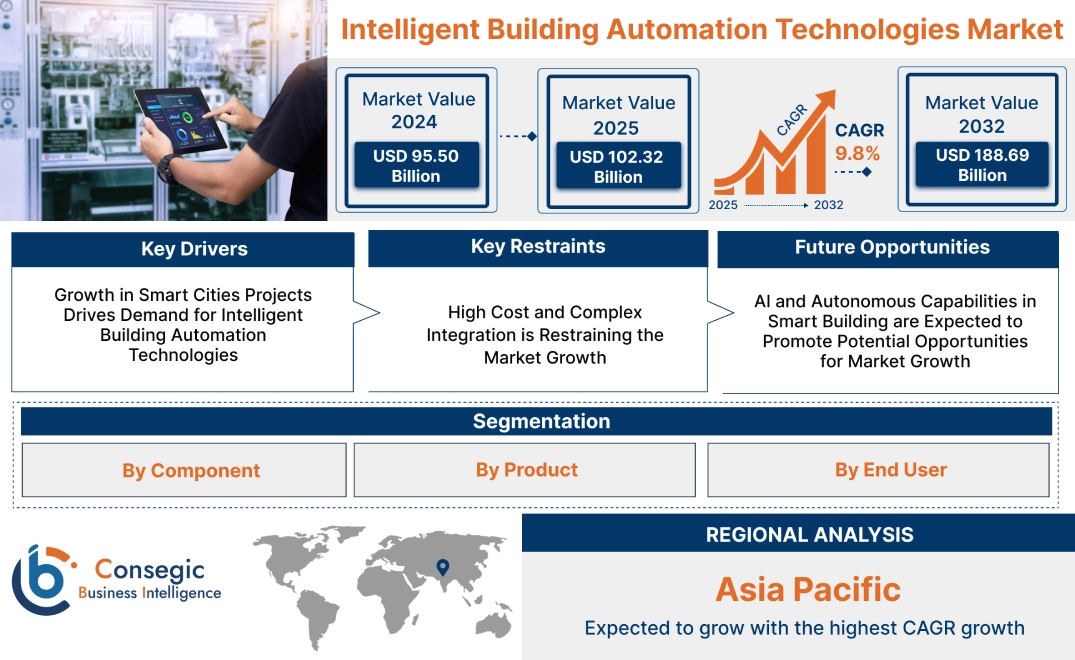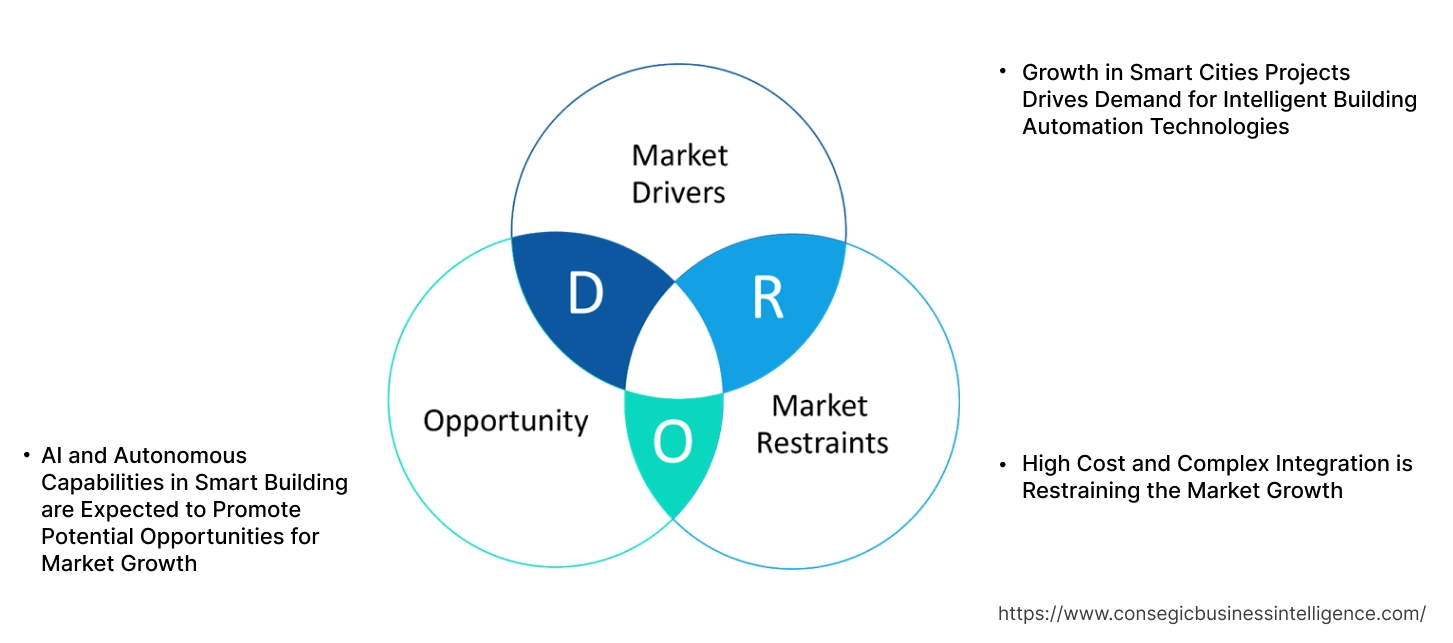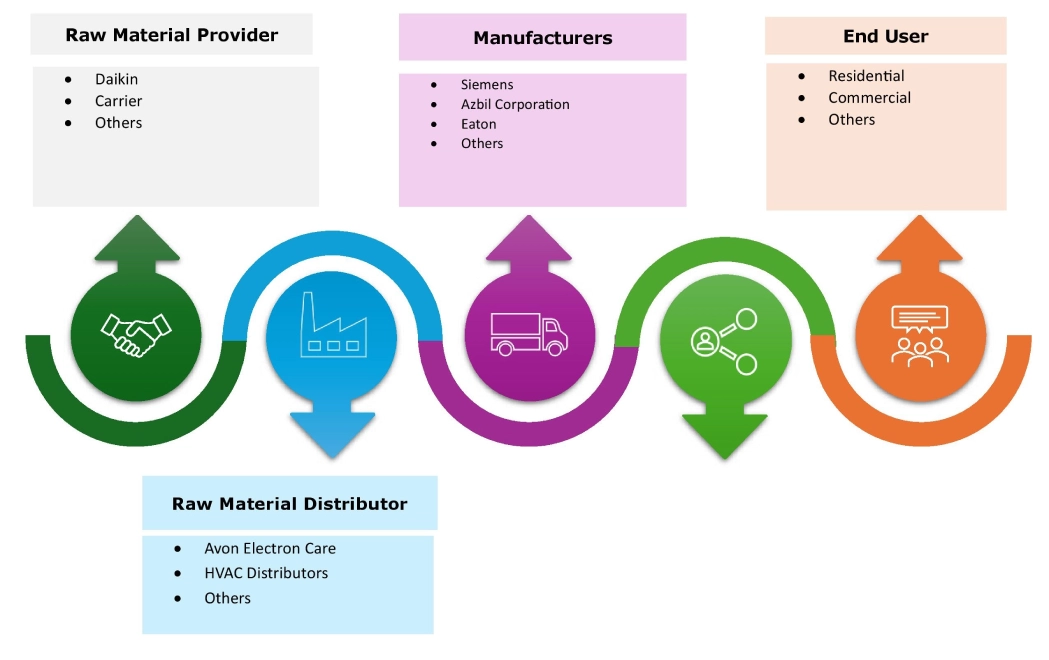- Summary
- Table Of Content
- Methodology
Intelligent Building Automation Technologies Market Size:
Intelligent Building Automation Technologies Market size is estimated to reach over USD 188.69 Billion by 2032 from a value of USD 95.50 Billion in 2024 and is projected to grow by USD 102.32 Billion in 2025, growing at a CAGR of 9.8% from 2025 to 2032.
Intelligent Building Automation Technologies Market Scope & Overview:
Intelligent building automation technologies encompasses components such as hardware, software and services utilized to automate and control various functions within a building, such as HVAC, lighting, security, and access control. Additionally, the technology aims to enhance energy efficiency and improve operational performance in turn driving the intelligent building automation technologies market growth. Moreover, the key advantages including improved occupant comfort, enhanced energy efficiency, reduced operational costs, and enhanced safety and security among others are boosting the intelligent building automation technologies market demand.
Key Drivers:
Growth in Smart Cities Projects Drives Demand for Intelligent Building Automation Technologies
The increasing number of smart cities projects and significant investment in the projects is driving the intelligent building automation technologies market demand. Additionally, the technologies enhance occupant comfort and contribute to overall city-wide improvements in energy efficiency, safety, and sustainability which in turn is fueling the intelligent building automation technologies market growth. Further, the smart city initiative aims to integrate various urban systems, including transportation, energy, water management, and waste management driving the demand for intelligent building automation technologies industry.
- For instance, according to IBEF, the work order for smart cities projects in India reached 8,016 projects which valued at USD 19.67 billion spanning across 100 cities in 2024.
Therefore, the increasing number of smart cities projects is driving the adoption of building automation technologies, in turn proliferating the growth of the market.
Key Restraints:
High Cost and Complex Integration is Restraining the Market Growth
The implementation of building automation system requires significant upfront investment as well as periodic maintenance cost which hinders the adoption of technologies. Additionally, the system is complex to design, install, and configure, often requiring specialized expertise and a team of technicians which in turn is hindering the intelligent building automation technologies market expansion. Further, the system is susceptible to technical glitches and failures leading to operational inefficiency is restraining the market adoption.
Therefore, the high costs and complex integration are restraining intelligent building automation technologies market expansion.
Future Opportunities :
AI and Autonomous Capabilities in Smart Building are Expected to Promote Potential Opportunities for Market Growth
The increasing focus towards adoption of sustainable and autonomous building solutions is paving the way for intelligent building automation technologies market opportunities. Additionally, AI and autonomous capabilities help devices to learn, adapt, and optimize their operations autonomously in turn driving the market adoption. Further, the smart building adoption enhances automation and control, provides predictive maintenance and fault detection among others.
- For instance, in January 2025, Trane Technologies acquired BrainBox AI. The acquisition aims to leverage Trane Technologies’ advanced building management and digital capabilities with BrainBox AI’s leading Artificial Intelligence technology to meet fast-growing demand for sustainable, autonomous building solutions.
Hence, the rising adoption of sustainable and autonomous building solutions is anticipated to increase the utilization in turn promoting prospect for intelligent building automation technologies market opportunities during the forecast period.
Intelligent Building Automation Technologies Market Segmental Analysis :
By Component:
Based on the component, the market is segmented into hardware, software, and service.
Trends in the Component:
- The rising adoption of cloud computing and AI for predictive maintenance is driving the adoption of software segment which in turn fuels the intelligent building automation technologies market trend.
- The increasing focus towards adoption of energy-efficient systems and smart sensors is fueling the adoption of hardware segment which in turn boosting the intelligent building automation technologies market trend.
Hardware accounted for the largest revenue share of 59.73% in the year 2024.
- The hardware component consists of sensors, controllers and actuators among others which helps to automate the operation.
- Additionally, focus on reduced energy consumption, increased efficiency and enhanced occupant comfort among others are fueling the intelligent building automation technologies market share.
- Further, the rising digitalization and automation in building management is driving the adoption of hardware components which in turn fuels the intelligent building automation technologies market size.
- For instance, in June 2021, LOYTEC have integrated IoT with building automation system to increase the value of smart buildings as well as control air-conditioning, lighting, security and other building subsystems.
- Thus, as per the market analysis, rising digitalization and automation is driving the market progress.
Services is anticipated to register the fastest CAGR during the forecast period.
- The services components encompass design and implementation of automated systems to enhance efficiency, reduce operational costs, and improve occupant experience.
- Moreover, the regular maintenance support required to manage building management systems in turn drives the intelligent building automation technologies market size.
- Further, the services segment helps in setting up and connecting various systems, including sensors, actuators, and control panels in turn driving the need for services segment.
- Therefore, according to the intelligent building automation technologies market analysis, need for regular maintenance support is anticipated to boost the market during the forecast period.
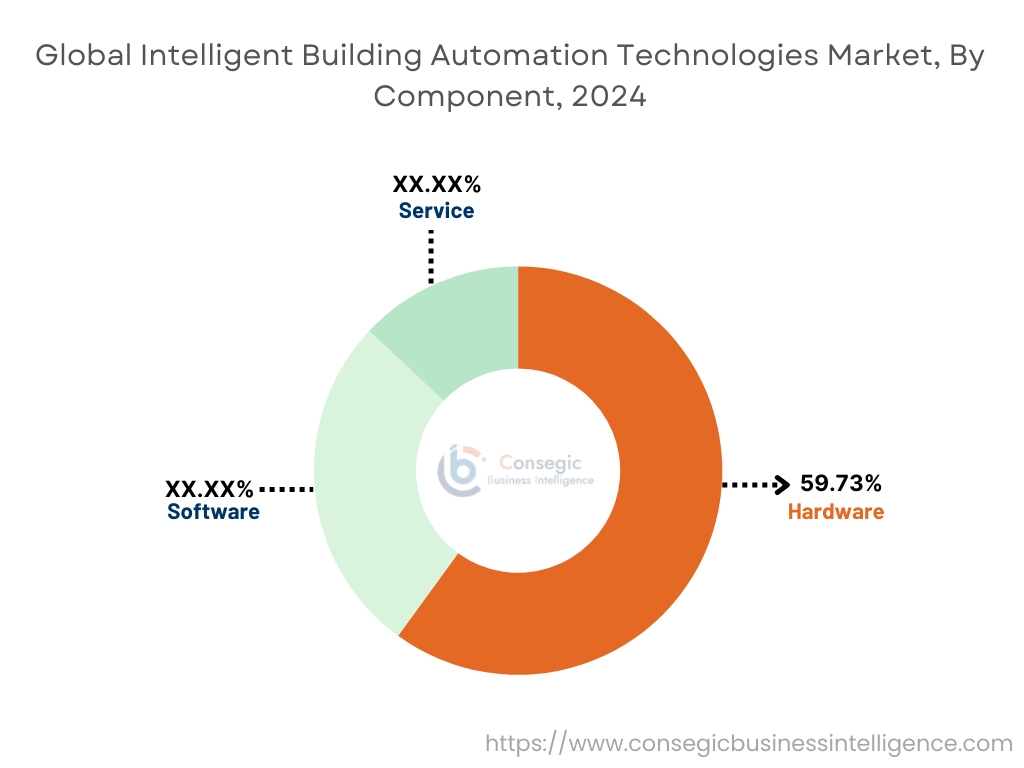
By Product:
Based on the product, the market is segmented into security systems, life safety systems, facility management systems, and building energy management systems.
Trends in the Product:
- The stringent safety rules and regulations in smart building management are propelling the adoption of life safety system which in turn fuels the market trend.
- The trend towards rising adoption of cloud based facility management system is boosting the market progress.
Building Energy Management Systems accounted for the largest revenue share in the year 2024.
- Building energy management systems are utilized to optimize energy consumption in buildings by managing HVAC, lighting, and other devices.
- Moreover, the integration of AI and IoT for real-time monitoring and optimization is fueling the intelligent building automation technologies market share.
- Further, the focus towards increasing efficiency, sustainability, and occupant comfort is driving the adoption of building energy management systems.
- For instance, in September 2024, Johnson Controls launched Metasys, which is an industry-leading building automation system aiming to improve energy management as well as optimize overall performance and sustainability in the building.
- Thus, according to the intelligent building automation technologies market analysis, focus towards increasing efficiency, sustainability, and occupant comfort is driving the adoption of building energy management systems.
Security Systems is anticipated to register the fastest CAGR during the forecast period.
- The security system encompasses various features such as biometric access control, advanced surveillance, and predictive maintenance which in turn drives the market progress.
- Moreover, the AI and IoT enable security system to analyze data from various sensors and security systems as well as exchange data, facilitate real-time monitoring and control.
- Further, the increasing focus towards improving cybersecurity capabilities is driving the adoption of security system in building.
- Therefore, as per the market analysis, the increasing focus towards improving cybersecurity capabilities is anticipated to boost the market during the forecast period.
By End-User:
Based on the end user, the market is segmented into residential, commercial, and industrial.
Trends in the End User:
- The trend towards rise in cloud computing and BIM technology is driving the market adoption in commercial buildings.
- The trend towards achieving sustainability goals and decarbonization is driving the market adoption in residential buildings.
Residential accounted for the largest revenue share in the market in 2024.
- The residential building utilizes building automation system to seamlessly communicate and exchange data among building systems and subsystems to improve overall building operations.
- Further, the increasing focus towards reducing energy consumption, optimizing resource usage, and integrating renewable energy, and other is driving the adoption in residential buildings.
- For instance, in March 2022, Kontrol Technologies Corp. secured USD 16 million project for a new high rise building in the Greater Toronto area. The company deployed HVAC and automation projects to the residential building.
- Thus, as per the market analysis, increasing focus towards reducing energy consumption is driving the market adoption in residential buildings.
Commercial is anticipated to register the fastest CAGR during the forecast period.
- The commercial building is utilizing various advanced security features such as biometric access control, surveillance systems, and others.
- Further, the commercial buildings are leveraging smart HVAC, lighting controls, security systems, and other to optimize various building systems, enhancing efficiency, comfort, and safety.
- Therefore, as per the market analysis, the ability to optimize various building systems, enhance efficiency, comfort, and safety are anticipated to boost the market during the forecast period.
Regional Analysis:
The regions covered are North America, Europe, Asia Pacific, Middle East and Africa, and Latin America.
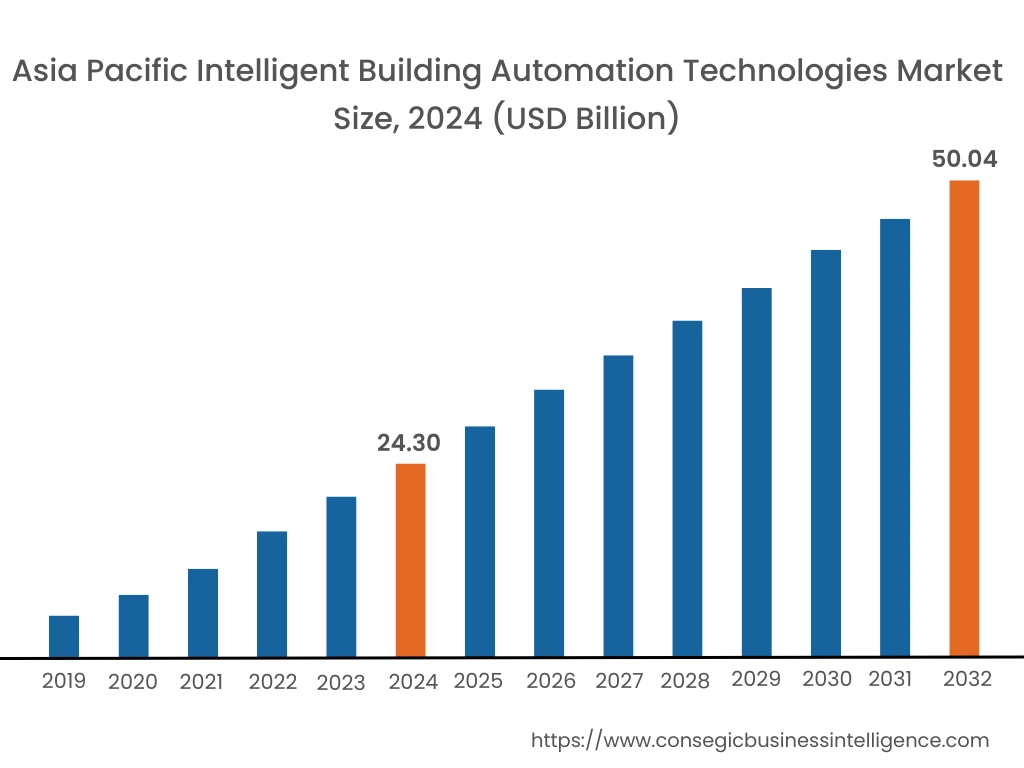
Asia Pacific region was valued at USD 24.30 Billion in 2024. Moreover, it is projected to grow by USD 26.13 Billion in 2025 and reach over USD 50.04 Billion by 2032. Out of this, China accounted for the maximum revenue share of 37.29%. The market growth is mainly driven by increasing adoption of smart city initiatives. Furthermore, factors including increasing focus towards decarbonization and sustainability are projected to drive the market progress in Asia Pacific region during the forecast period.
- For instance, in March 2025, Mahindra Group based out in India partnered with Johnson Controls to launch net zero buildings initiative to decarbonize commercial, residential and government buildings.
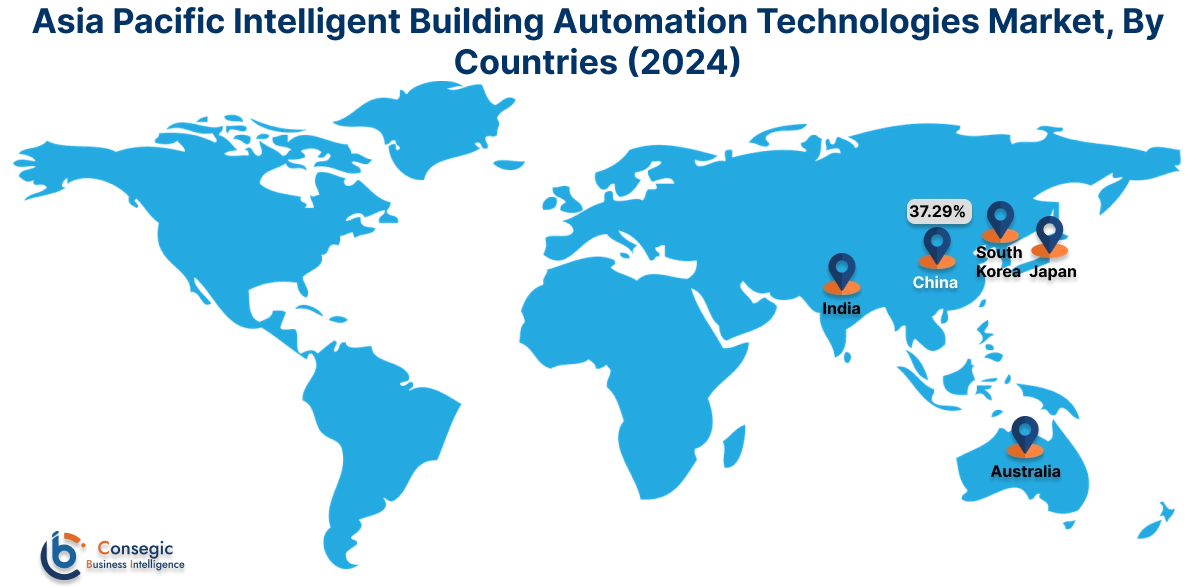
North America is estimated to reach over USD 66.61 Billion by 2032 from a value of USD 34.01 Billion in 2024 and is projected to grow by USD 36.41 Billion in 2025. The North American region's increasing IoT adoption offer lucrative growth prospects for the market. Additionally, the government initiatives for smart cities are driving the market evolution.
- For instance, in December 2024, Delta launched DIBT which is a IoT-based smart green solutions designed to optimize building efficiency, energy conservation, security, and occupant comfort across North America.
The regional evaluation depicts that the need for improved building performance and sustainability goals is driving the market in Europe. Additionally, the key factor driving the market is increasing urbanization and industrialization is propelling the market adoption in the Middle East and African region. Further, the smart city initiative is paving the way for the progress of market in Latin America region.
Top Key Players and Market Share Insights:
The global intelligent building automation technologies market is highly competitive with major players providing intelligent building automation technologies to the national and international markets. Key players are adopting several strategies in research and development (R&D), product innovation, and End User launches to hold a strong position in the intelligent building automation technologies industry. Key players in the intelligent building automation technologies market include-
- Schneider Electric (France)
- Johnson Controls (USA)
- Honeywell International Inc. (USA)
- Hubbell (USA)
- Ingersoll Rand (USA)
- ABB (Switzerland)
- Siemens (Germany)
- Azbil Corporation (Japan)
- Eaton (Ireland)
- General Electric (USA)
Recent Industry Developments :
Product Launches:
- In June 2024, Schneider Electric launched SMART buildings division which offers comprehensive solutions to accelerate decarbonization and sustainability goals for building.
- In January 2024, Honeywell launched advance control building management system to increase operational efficiency and sustainability as well as help improve the occupant experience.
Intelligent Building Automation Technologies Market Report Insights:
| Report Attributes | Report Details |
| Study Timeline | 2019-2032 |
| Market Size in 2032 | USD 188.69 Billion |
| CAGR (2025-2032) | 9.8% |
| By Component |
|
| By Product |
|
| By End-User |
|
| By Region |
|
| Key Players |
|
| North America | U.S. Canada Mexico |
| Europe | U.K. Germany France Spain Italy Russia Benelux Rest of Europe |
| APAC | China South Korea Japan India Australia ASEAN Rest of Asia-Pacific |
| Middle East and Africa | GCC Turkey South Africa Rest of MEA |
| LATAM | Brazil Argentina Chile Rest of LATAM |
| Report Coverage |
|
Key Questions Answered in the Report
How big is the intelligent building automation technologies market? +
The intelligent building automation technologies market size is estimated to reach over USD 188.69 billion by 2032 from a value of USD 95.50 billion in 2024 and is projected to grow by USD 102.32 billion in 2025, growing at a CAGR of 9.8% from 2025 to 2032.
Which segmentation details are covered in the intelligent building automation technologies report? +
The intelligent building automation technologies report includes specific segmentation details for component, product, end user, and regions.
Which is the fastest segment anticipated to impact the market growth? +
In the intelligent building automation technologies market, the security systems is the fastest-growing segment during the forecast period due to increasing focus towards improving cybersecurity capabilities.
Who are the major players in the intelligent building automation technologies market? +
The key participants in the intelligent building automation technologies market are Schneider Electric (France), Johnson Controls (USA), ABB (Switzerland), Siemens (Germany), Azbil Corporation (Japan), Eaton (Ireland), General Electric (USA), Honeywell International Inc. (USA), Hubbell (USA), Ingersoll Rand (USA) and others.
What are the key trends in the intelligent building automation technologies market? +
The intelligent building automation technologies market is being shaped by several key trends including stringent safety rules and regulations in smart building management as well as increasing focus towards adoption of energy-efficient systems and smart sensors and other are the key trends driving the market.
